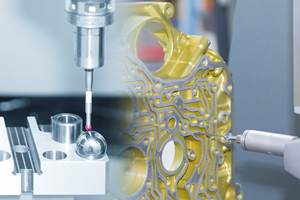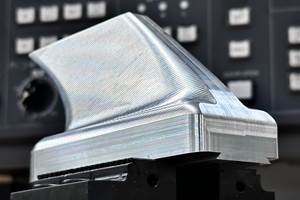How to Continuously Improve Your Machine Shop
Monthly Kaizen events could help your company improve operations in 12 ways.
Share




There are typically two approaches companies take to improve their operations. The first is a project in which a plan is created to develop the improvement, determine the resources required and schedule its implementation. The second is a Kaizen event during which a group of employees are tasked with making narrowly focused improvements in a short duration of time. Although both approaches to continuous improvement have their benefits, companies that have employed Kaizen events have realized many “good changes” (the literal translation of the Japanese word) faster and with less effort.
Employee participation in the Kaizen event is key to its success. Employees should be assembled from different departments to bring a variety of perspectives and a better overall outcome. The more an employee participates in Kaizen events, the better a participant he or she becomes. In fact, Kaizen veterans are likely to be extremely valuable participants, even during events unrelated to their specific areas of expertise.
A Kaizen event can take place anywhere in an organization. I have personally worked with companies on Kaizen events in machine shops, assembly departments, plating operations, finishing areas, warehouses, shipping and receiving departments, and even administrative operations such as purchasing, accounting, customer service and planning/scheduling. Every one of these events produced outcomes that exceeded the effort expended. Those of you who have been involved in Kaizen events have probably found similar success. Speaking of success, Kaizen events are known to be a technique in which “success breeds success.” When one event is completed, benefits are seen and word spreads, creating momentum for the next Kaizen event. Participants in subsequent Kaizen events may even feel a healthy sense of competitiveness as they seek success that exceeds previous events.
So what type of specific processes or operations are candidates for Kaizen events? I would say anything that is done on a regular basis in which there is an opportunity to do it better. For instance:
- Machine Shops. A Kaizen event here can focus on any number of processes. An obvious one is machine setup. A group can review a setup and apply the single-minute exchange of die (SMED) concept to identify and eliminate waste from the time the last good piece is produced from the prior job to the first good piece is produced on the next job. Performing routine preventive maintenance on equipment can also benefit from the Kaizen approach. The preventive maintenance process can be reviewed with a goal of simplification. Some steps may be unnecessary to keep the equipment running, while others that are not being performed may actually be beneficial to extending the machine’s life. Organizing tools and fixtures stored in a machine shop can also be addressed in a Kaizen format. Time can be saved when an area is well organized with “a place for everything, and everything in its place.”
- Warehouses. Kaizen events here can focus on frequently occurring processes such as order picking, putting incoming inventory in its proper location and cycle counting. Small and mid-size companies do not always invest time trying to improve such tasks, so a Kaizen approach is ideal. During a recent Kaizen event, a company developed a clever way of combining the order picking and inventory put-away processes. As part of the event, a new pick/putaway cart was configured and used the same day, thereby demonstrating the Kaizen objective of quickly making good changes.
- Purchasing Departments. Kaizen events here can also review frequently occurring processes. Delays are often inherent to the tasks of requesting and obtaining quotes, selecting vendors and placing purchase orders. Likewise, repetitive, non-value-added steps can result in a resource drain that hinders the effectiveness of the purchasing operation. A Kaizen event may be just what is needed to challenge some of these processes and generate ideas for improvement.
- Customer Service Departments. A Kaizen event here may review the flow of incoming information and outgoing orders. Simply looking at how this information is received, how often is it touched and handed off, and how long it takes to complete the process can be quite revealing. One company’s Kaizen event discovered their process included numerous unnecessary handoffs. They were unnecessary because everyone in the department was trained to do all required tasks, so touching an order only once was enough to complete it.
Kaizen events can produce outstanding results, but they need to be scheduled frequently to maximize their impact. If Kaizen events can take place on a monthly basis, 12 “good changes” can be implemented each year. This is truly continuous improvement done continuously.
Related Content
Rethink Quality Control to Increase Productivity, Decrease Scrap
Verifying parts is essential to documenting quality, and there are a few best practices that can make the quality control process more efficient.
Read MoreWhat are Harmonics in Milling?
Milling-force harmonics always exist. Understanding the source of milling harmonics and their relationship to vibration can help improve parameter selection.
Read MoreCustom Workholding Principles to Live By
Workholding solutions can take on infinite forms and all would be correct to some degree. Follow these tips to help optimize custom workholding solutions.
Read More4 Rules for Running a Successful Machine Shop
Take time to optimize your shop’s structure to effectively meet demand while causing the least amount of stress in the shop.
Read MoreRead Next
Setting Up the Building Blocks for a Digital Factory
Woodward Inc. spent over a year developing an API to connect machines to its digital factory. Caron Engineering’s MiConnect has cut most of this process while also granting the shop greater access to machine information.
Read More5 Rules of Thumb for Buying CNC Machine Tools
Use these tips to carefully plan your machine tool purchases and to avoid regretting your decision later.
Read MoreBuilding Out a Foundation for Student Machinists
Autodesk and Haas have teamed up to produce an introductory course for students that covers the basics of CAD, CAM and CNC while providing them with a portfolio part.
Read More



































